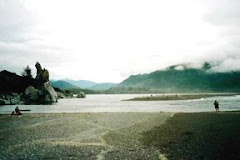Even the governing boards of some organizations whose representatives negotiated the Deal have judged it to be inadequate and indicated that – unless changes are made – they will not sign or support it.
While those who spent so much time “bonding” in those closed door motel conference rooms appear genuinely surprised by the magnitude and intensity of the opposition, the reaction is really quite predictable. For one thing, although 26 entities participated – some along with a staff of lawyers and scientists - few of those in the room actually live in the
In addition, history has demonstrated time and again that deals negotiated in secret rarely if ever provide real solutions; it is just too tempting under such circumstances for those interests who are in the room to advance their self interest at the expense of those who are not in the room. Even if all interests were present, those with greater negotiating skills and larger staff resources will usually come out on top. When the losers recognize what has happened to them it is often too late.
Whether or not those who want it enshrined in law succeed, it is clear that the Deal will not - as some have claimed - usher in a new era of Peace on the River. Legislation based on the Deal as currently written would result in huge fights in Congress and state legislatures and, if it were nevertheless passed into law, decades of bitter litigation would ensue.
So, for those who truly want to achieve a peaceful resolution to the Klamath’s persistent water conflicts, where did the process go wrong and what should we do now?
To find answers we need look no further than the year 2006 and the group sessions known, in honor of the man who facilitated them, as the “Chadwick Sessions.” After nearly a year of rotating encounter events sponsored by the Klamath Basin Compact Commission and funded by the Bureau of Reclamation, Chadwick participants – including those leaders who would come to dominate closed door Settlement Negotiations – were discussing formation of a Klamath Congress – an institution in which all the people and interests of the Klamath River Basin could have a voice in shaping a shared future where cooperation would replace competition and dialog would replace lawsuits.
This was not an idle proposal – the leaders who had stayed with the Chadwick process were serious. In fact, plans were made to use the 2006 version of the “Klamath River Basin Restoration Conference” scheduled for November in
But the Congress never happened. Instead of launching an open and democratic process to work for solutions fair to everyone, the good will generated in the Chadwick Sessions was highjacked and used to launch a closed door process to which certain interests were invited and from which other interests were excluded. Most importantly, there was no public oversight or even public disclosure about what was being discussed.
Is it any surprise then that the “Agreement” produced by such a process would engender conflict the likes of which we have not seen in this Basin since the days following the 2002 fish kill?
Some will respond that this dredging up of “old" history is not productive. To this KlamBlog must counter that ignorance of history has generally lead to unintended and undesired consequences. Often such ignorance has lead to war.
But our purpose here is not to sermonize on the importance of remembering the lessons of history. Rather it is to suggest that perhaps it is time to revive the idea of a Klamath Congress. While it is true that such a process would be messy, Democracy – with all its inefficiencies - remains the best system the world has yet devised to assure fairness and justice.
Is a fair and just accommodation on
We are all fond of paying lip service to Democracy; maybe the time has come on the Klamath to actually give it a try.


No comments:
Post a Comment